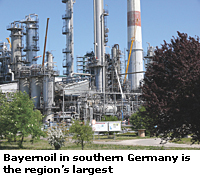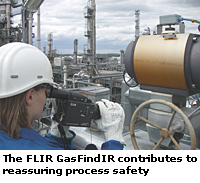Bayernoil refinery uses FLIR GasFindIR to detect leaks
07/01/2009
Biggest refinery in southern Germany integrates FLIR GasFindIR into its leak detection and repair programmes The Bayernoil refinery complex is located in southern Germany and has three refinery, production and storage sites in Ingolstadt, Neustadt and Vohburg (between Munich, Nuremberg and Regensburg). It is owned by oil corporations OMV, Agip, BP and Ruhr Oel. Over 800 employees process annually 12m tonnes of crude oil that is refined into oil products. Safety and environmental considerations are firmly integrated in the company's quality and production management. Moreover, Bayernoil has a stringent zero-accident policy, hence the importance of preventive maintenance at the three sites.
The Bayernoil refinery complex is located in southern Germany and has three refinery, production and storage sites in Ingolstadt, Neustadt and Vohburg (between Munich, Nuremberg and Regensburg). It is owned by oil corporations OMV, Agip, BP and Ruhr Oel. Over 800 employees process annually 12m tonnes of crude oil that is refined into oil products. Safety and environmental considerations are firmly integrated in the company's quality and production management. Moreover, Bayernoil has a stringent zero-accident policy, hence the importance of preventive maintenance at the three sites.Looking for fugitive emissions, refinery plants are subjected to a general turnover, a huge inspection and maintenance operation during which units are taken out of operation, partially dismantled, cleaned, maintained and tested. At the Vohburg plant, some 1500 additional workers are involved in this process which usually takes several weeks.
 "Our main reason to procure the FLIR GasFindIR is to minimise hydrocarbon gas discharges from our piping systems, in particular, leaks near flange gaskets," says John Stapleford, HSE (Health, Security, Environment) Manager of the Bayernoil plants. The start-up of the serviced Vohburg units provided an excellent opportunity to inspect the installations for leaks that might have remained after the turnaround.
"Our main reason to procure the FLIR GasFindIR is to minimise hydrocarbon gas discharges from our piping systems, in particular, leaks near flange gaskets," says John Stapleford, HSE (Health, Security, Environment) Manager of the Bayernoil plants. The start-up of the serviced Vohburg units provided an excellent opportunity to inspect the installations for leaks that might have remained after the turnaround.Bayernoil is integrating the FLIR GasFindIR into its Leak Detection and Repair programmes. Although environmental and safety prescriptions are stringent, there is currently no specific European LDAR programme that stipulates how often and complete companies must find, repair and report leaks of volatile organic compounds. Bayernoil wants to exchange their experiences with other FLIR GasFindIR users within the Bayernoil owner companies to determine the optimum inspection intervals.
"The FLIR GasFindIR contributes to reassuring process safety," concludes Mr Stapleford. "It is particularly interesting to inspect high-pressure systems as they are the most susceptible to leaks."